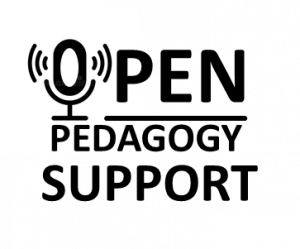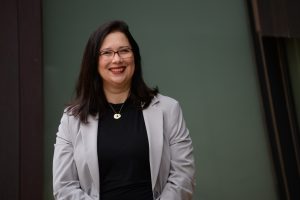Open Pedagogy Support Podcast – Episode 3
Mandi Goodsett

More and more teachers are using creative classroom assignments to help students take ownership of their learning. But when classroom assignments involve public-facing projects, what are the copyright implications? And how can students be responsibly invited to share their voices with the world? This podcast invites faculty to share how they incorporate public-facing projects (such as open pedagogy and multimodal projects) into the classroom, and how librarians and others partner with them for success.

Suzanne Marmo, PhD, LCSW is an Assistant Professor of Social Work at Sacred Heart University in Fairfield, Connecticut. Her research interests include palliative and hospice social work, the role of social work in health care organizations, and social justice and inequities in palliative care and health care systems. She was an OER fellow at Sacred Heart University in 2019-2020 and is currently the Connecticut representative for New England Board of Higher Education’s Community of Practice. Her interest in OER comes from her belief that using OER is a matter of social justice to help promote more equitable access to learning for all students. Dr Marmo is interested in how open pedagogy can empower social work students to develop competency in social work practice, and act as partners in creation of educational materials for students. Dr Marmo has redesigned three courses to completely OER content in her social work program and uses renewable assignments to create content with current students to help prepare future students.
In this podcast episode, Suzanne describes her passion for making social work education accessible to more students, and how her teaching improved when she embraced renewable assignments in her classes.
Faculty Discussion/Reflection Questions:
- Are there any subjects in your discipline that would be better taught through an exploratory assignment, rather than an instructor lecture?
- How might you approach giving students more input into their own grades in your classes? What challenges and benefits might this approach introduce?
- Open pedagogy projects can often be more unstructured than traditional assignments, which can make some students anxious. How can instructors help students address this anxiety when trying to learn in a new way? When is it appropriate to allow students to do a more traditional assignment instead?
Helpful Resources:

